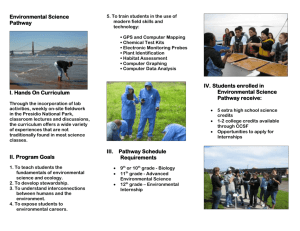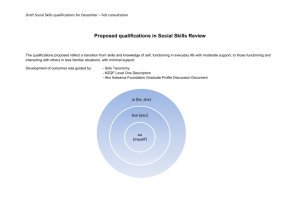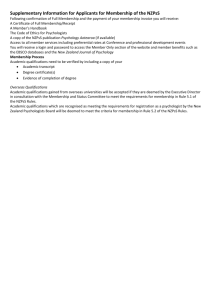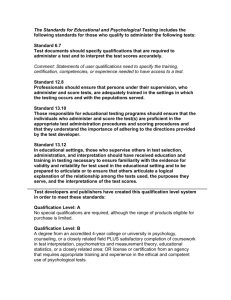Revised Draft Qualifications after consultation
advertisement
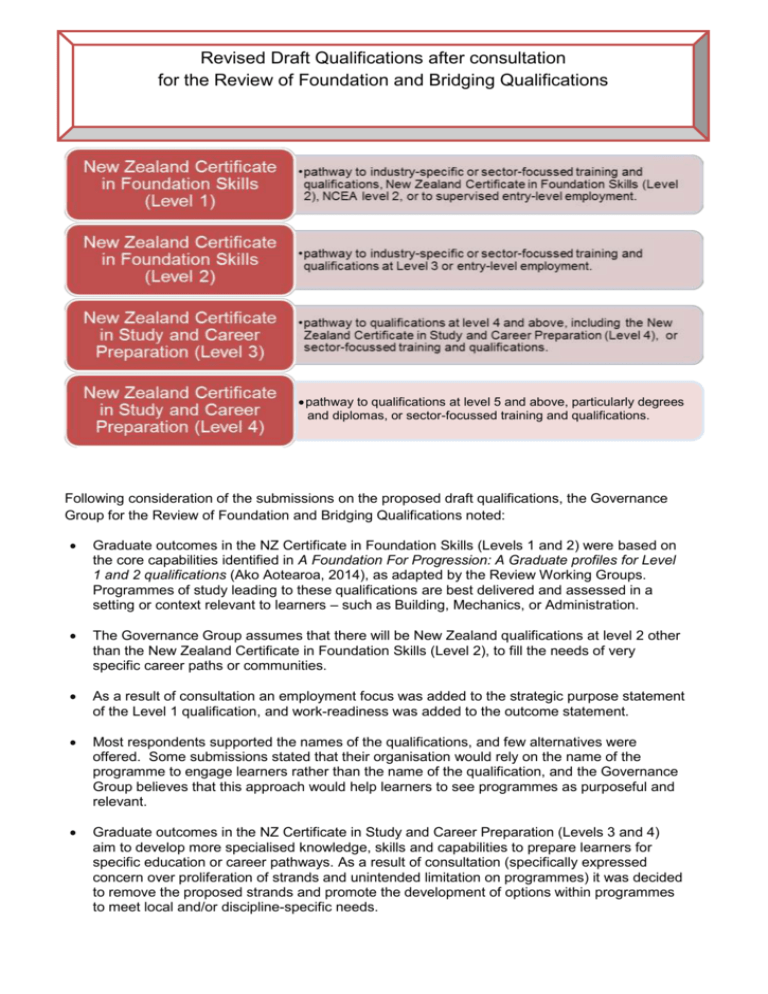
Revised Draft Qualifications after consultation for the Review of Foundation and Bridging Qualifications pathway to qualifications at level 5 and above, particularly degrees and diplomas, or sector-focussed training and qualifications. Following consideration of the submissions on the proposed draft qualifications, the Governance Group for the Review of Foundation and Bridging Qualifications noted: Graduate outcomes in the NZ Certificate in Foundation Skills (Levels 1 and 2) were based on the core capabilities identified in A Foundation For Progression: A Graduate profiles for Level 1 and 2 qualifications (Ako Aotearoa, 2014), as adapted by the Review Working Groups. Programmes of study leading to these qualifications are best delivered and assessed in a setting or context relevant to learners – such as Building, Mechanics, or Administration. The Governance Group assumes that there will be New Zealand qualifications at level 2 other than the New Zealand Certificate in Foundation Skills (Level 2), to fill the needs of very specific career paths or communities. As a result of consultation an employment focus was added to the strategic purpose statement of the Level 1 qualification, and work-readiness was added to the outcome statement. Most respondents supported the names of the qualifications, and few alternatives were offered. Some submissions stated that their organisation would rely on the name of the programme to engage learners rather than the name of the qualification, and the Governance Group believes that this approach would help learners to see programmes as purposeful and relevant. Graduate outcomes in the NZ Certificate in Study and Career Preparation (Levels 3 and 4) aim to develop more specialised knowledge, skills and capabilities to prepare learners for specific education or career pathways. As a result of consultation (specifically expressed concern over proliferation of strands and unintended limitation on programmes) it was decided to remove the proposed strands and promote the development of options within programmes to meet local and/or discipline-specific needs. A range of programmes of study or training can lead to each qualification and allow achievement of the qualification in ways most suited to learners’ educational, work or cultural needs and aspirations. The Governance Group believes that, for foundation and bridging education, it is important that rules around programmes support flexibility. The Governance Group agrees with the concern expressed by some submissions that allocating credits to each of the graduate outcome clusters and suggests this may create unnecessary programme design constraints to meet the needs of some learners. Learners pursuing these qualifications are and will be highly diverse with a wide range of pre-existing capabilities and skills (see A Foundation for Progression for a discussion of this issue as it relates to levels 1 and 2). Similarly, the qualifications are intended to support progression through a variety of individual pathways. Providers will need to continue to be able to meet specific target group needs as required. However, some indication of the relative importance of each graduate outcome is required both to maintain coherency of the qualifications and by NZQA qualification development rules. The Group is therefore recommending that a credit range is applied to each outcome cluster (refer to the draft qualifications). This will allow programme developers more flexibility to meet the specific needs of their intended target learners and/or pathway. It is anticipated that programme approval rules will require developers to justify the allocation of credits to each outcome cluster. Many submissions raised the issue of University Entrance and articulation from non-university providers into university programmes. These are particularly relevant for international and mature learners. The Governance Group’s remit does not include these issues, but the Group recognises these concerns and has communicated them to Universities NZ and NZQA. Title Level NZ Certificate in Foundation Skills (Level 1) Credits 1 60 Strategic purpose statement The purpose of this qualification is to recognise the capabilities of individuals that enable them to participate within a range of communities relevant to them, and to prepare them for further learning and employment. Holders of this qualification will have the confidence, skills, knowledge, and attributes needed to progress to further and more focused learning, and to participate in their communities. This will benefit both whānau and communities by supporting positive family and community participation. Individuals will re-engage with learning and employment through a focus on literacy, numeracy and technology in a range of contexts. Graduates will be able to apply core capabilities in a range of simple and structured contexts, to a level that prepares them to succeed in an NZQF level 2 qualification and/or supervised entry level employment. Graduate profile Graduates will be able to: Self (15-20 Credits) Use self-management strategies with guidance. e.g. manage personal well-being, financial literacy, time-management Build one’s own cultural identity and begin to identify similarities and differences in individuals’ perspectives. Set and work towards simple goals, including learning and career goals. Outcome Statement Community and Work (10-15 credits) Follow basic health and safety practices. Participate as part of a team/group. Interact positively and confidently with others in familiar contexts. Understand basic te Ao Māori concepts and the role of te Tiriti in Aotearoa. Apply solutions to simple problems. Use work ready strategies with guidance Learning (25-30 credits) Use basic language, literacy and numeracy learning and technology skills for everyday life. Education pathway Employment and community pathway This qualification is intended as a starting point for engaging or reengaging with learning. Holders of this qualification will be able to progress to further study or training in specific industry or sector-focused qualifications, the National Certificate in Educational Achievement (Level 2) or to the New Zealand Certificate in Foundation Skills (Level 2). Graduates may be able to progress directly to Level 3 in some areas. A graduate will be able to participate in their whānau and wider community, and work in structured, supervised entry level roles. Title Level Strategic purpose statement NZ Certificate in Foundation Skills (Level 2) Credits 2 60 The purpose of this qualification is to enable individuals to contribute within a range of communities relevant to them, and to prepare them for further learning, training, community participation, and work in a specific area or industry. Holders of this qualification will have the confidence, skills, knowledge, and attributes needed to contribute positively to their communities and to progress to further and more focused education and training, including improved employment outcomes. This will benefit whānau, communities, and employers by supporting positive contributions to these contexts. Individuals will re-engage with learning and employment through a focus on literacy, numeracy and technology in a range of contexts. Graduates will be confident in applying core capabilities in a range of familiar contexts, to a level that prepares them to complete NCEA level 2, and/or succeed in an NZQF level 3 qualification and/or enter employment. Graduate profile Graduates will be able to: Self (18-23 Credits) Select and apply self-management strategies. Describe own cultural identity and explore diverse perspectives in Aotearoa NZ, including (but not limited to) Māori and Pasifika. Set and work towards short term to long term goals, including learning and career goals. Outcome Statement Community and Work (18-23 credits) Identify and apply health and safety practices. Participate and contribute constructively as part of a team/group. Interact positively and confidently with others in a range of contexts. Apply basic knowledge of te Ao Māori concepts and NZ culture, including Tiriti o Waitangi principles. Apply core knowledge, skills and attributes to a relevant employment or community context. Apply standard techniques to solve problems. Use work ready strategies independently. Learning (18-23 credits) Apply language, literacy and numeracy skills and technology to a known context. Manage own learning and study. Education pathway This qualification is intended as a starting point for engaging or reengaging with learning. In some cases, it may also be used by holders of the New Zealand Certificate in Foundation Skills (Level 1) to further develop their core capabilities. Holders of this qualification will be able to progress to further study or training in specific industry or sector-focused qualifications at NZQF Level 3 or to the New Zealand Certificate in Study and Career Preparation (Level 3 or 4). Employment /community A graduate will be able to contribute within their whānau and wider pathway community, and work in entry level roles. Title New Zealand Certificate in Study and Career Preparation (Level 3) Level Strategic purpose statement 3 Credits 60 The purpose of this qualification is to recognise those capabilities that enable individuals to enter and succeed in further study. This qualification is also for people who wish to develop the skills, knowledge and attributes necessary for specific career pathways that require further education and training. Holders of this qualification will have the skills, knowledge, and attributes necessary to succeed in study at higher levels and to participate in relevant work environments where appropriate. This will benefit tertiary education providers and employers in New Zealand. Graduates will be confident in applying a range of skills, knowledge, and capabilities, to a level that prepares them to succeed in an industry or discipline-specific qualification at NZQF level 4 or above. Graduate profile Graduates will be able to: Self and community (10-15 credits) Self-manage learning in familiar settings with support. Describe and apply knowledge of self and community to familiar settings, including te Ao Māori. Work effectively in groups with limited support. Outcome Statement Core competencies (10-15 credits) Locate, select, and apply relevant information from a variety of specified sources in a planned way. Communicate clearly using a range of media, in a way which is fit-for-purpose and in a variety of contexts. Solve problems in familiar contexts. Engage with online environments and digital technologies, in a range of settings, with support. Apply literacy and numeracy skills to a specific pathway. Identify possible opportunities for future study or career pathway. Pathways (30-40 credits) Apply core knowledge, skills and attributes to topics specific to a study or career pathway. Education pathway Holders of this qualification will be able to progress to further study or training at NZQF level 4 and above, including the New Zealand Certificate in Study and Career Preparation (Level 4). Employment pathway Graduates of this Certificate will be prepared to pursue a career pathway that includes further education and training, and will have enhanced employment opportunities in relevant industries. Title New Zealand Certificate in Study and Career Preparation (Level 4) Level 4 Strategic purpose statement Credits 60 The purpose of this qualification is to recognise those capabilities that enable individuals to enter and succeed in further study at degree or diploma level. This qualification is also for people who wish to develop the skills, knowledge and attributes necessary for specific career pathways that require further education and training at an advanced level. Holders of this qualification will have the skills, knowledge, and attributes necessary to succeed in study at higher levels and to participate in relevant work environments where appropriate. This will benefit tertiary education providers and employers in New Zealand. Graduates will be confident in applying a range of skills, knowledge, and capabilities, to a level that prepares them to succeed in an industry or discipline-specific NZQF qualification at level 5 or above, including under-graduate degree level education. Graduate profile Graduates will be able to: Self and community (10-15 credits) Self-manage learning in a variety of settings under broad guidance. Describe and apply knowledge of self and community to a range of settings, including te Ao Māori and a chosen study or career pathway. Work effectively in groups under broad guidance, with some responsibility for the performance of others. Outcome Statement Core competencies (10-15 credits) Locate, select, and apply relevant information from a variety of sources in a planned way, to familiar and sometimes unfamiliar problems. Communicate in a clear and reasoned way which is fit-forpurpose, using a range of media and in a variety of contexts. Use critical thinking in problem-solving. Engage confidently with online environments and digital technologies, in a range of settings. Apply academic and digital literacies in a range of settings. Pathways (30-40 credits) Apply core knowledge, skills and attributes to topics specific to a study or career pathway. Education pathway Holders of this qualification will be able to progress to further study or training at NZQF level 5 and above (degree, diploma or certificate). Employment pathway Graduates of this Certificate will be prepared to pursue a career pathway that includes further education and training at an advanced level, and will have enhanced employment opportunities in relevant industries.
